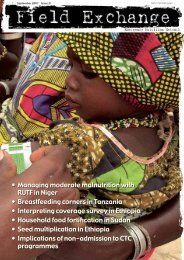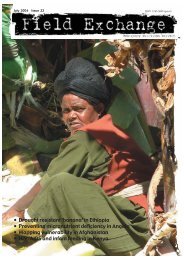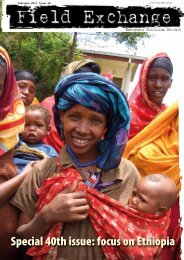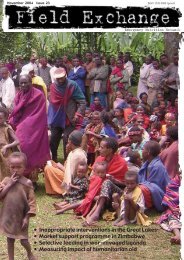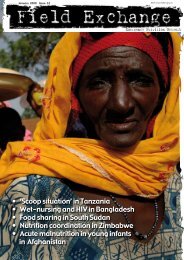Download a PDF of this issue - Field Exchange - Emergency ...
Download a PDF of this issue - Field Exchange - Emergency ...
Download a PDF of this issue - Field Exchange - Emergency ...
You also want an ePaper? Increase the reach of your titles
YUMPU automatically turns print PDFs into web optimized ePapers that Google loves.
News<br />
UNHCR standardised nutrition<br />
survey guidelines and training<br />
By Melody Tondeur and Andrew Seal<br />
Melody Tondeur is an<br />
ENN Consultant and one<br />
<strong>of</strong> the team members<br />
implementing the<br />
Anaemia Control,<br />
Prevention and<br />
Reduction Project, a collaborative work<br />
between the UNHCR and ENN.<br />
Andrew Seal is Lecturer<br />
at UCL Centre for<br />
International Health<br />
and Nutrition and a<br />
senior technical advisor<br />
to the ENN on the<br />
UNHCR/ENN Anaemia Control,<br />
Prevention and Reduction Project.<br />
Dadaab nutrition surveys,<br />
August-September 2011<br />
Sarah Style, ENN/UNHCR, Kenya, 2011<br />
Nutritional outcomes continue to be <strong>of</strong><br />
concern in most refugee contexts.<br />
UNHCR recommends the measurement<br />
<strong>of</strong> anthropometric status, anaemia and<br />
other associated indicators (including water,<br />
sanitation and hygiene (WASH) and mosquito<br />
net coverage) on an annual basis in order to<br />
monitor situations and to react in a timely<br />
manner to any deterioration.<br />
A 2009 review <strong>of</strong> UNHCR nutrition surveys<br />
worldwide highlighted a lack <strong>of</strong> standardisation<br />
in methodologies, in the type <strong>of</strong><br />
information collected and in data presentation.<br />
Training on survey guidelines<br />
UNHCR and ENN in collaboration with the Centres for<br />
Disease Control and Prevention (CDC) implemented<br />
two 8-day long regional training workshops in Kenya<br />
(Naivasha, October 2010) and Hungary (Budapest,<br />
UNHCR training centre, May 2011) for key nutrition<br />
technical staff and UNHCR’s implementing partners.<br />
The workshop objectives were to:<br />
• Improve the quality and reliability <strong>of</strong> nutrition<br />
survey data collected in refugee operations.<br />
• Establish standardised data collection, analysis and<br />
reporting for refugee operations.<br />
• Build capacity <strong>of</strong> technical staff from UNHCR and<br />
implementing partners for conducting<br />
standardised nutritional surveys.<br />
The expected training outcomes were that participants<br />
know how to use the SMART tools appropriately<br />
and how to assess anaemia, WASH and mosquito net<br />
coverage indicators, are able to use standard methods<br />
to implement nutritional surveys, gather reliable data,<br />
and analyse and report on results, and can identify<br />
areas <strong>of</strong> improvement for nutritional survey implementation<br />
among refugee populations.<br />
Candidates were prioritised based on criteria using a<br />
questionnaire developed by Action Contre la Faim<br />
Canada (ACF-Ca) and adapted by ENN and UNHCR<br />
that included experience in nutrition surveys, training,<br />
data collation, report writing and working in refugee<br />
populations. A total <strong>of</strong> 29 participants from 13 countries<br />
from UNHCR <strong>of</strong>fices, six non-governmental<br />
organisations (NGOs) and one government agency<br />
were selected.<br />
The training covered SMART (SMART Standardised<br />
Training Package), Epi Info (and the ENA/Epi Info hybrid<br />
s<strong>of</strong>tware) and the UNHCR Standardised Nutrition<br />
Survey Guidelines (SNSG). Evening sessions were<br />
<strong>of</strong>fered on a daily basis and covered the day’s topics.<br />
Participants were evaluated on the SMART component<br />
<strong>of</strong> the training only, using the SMART<br />
In order to measure trends over time in the<br />
same region, as well as across regions and<br />
populations, surveys need to be replicable and<br />
the same definitions, geographic boundaries,<br />
and methodologies need to be used from year<br />
to year. To help overcome these challenges,<br />
UNHCR encourages the adoption <strong>of</strong> the internationally<br />
recognised SMART 1 methods for<br />
survey design and anthropometric measurements.<br />
However, surveys conducted by UNHCR<br />
and its partners typically collect data on a much<br />
wider set <strong>of</strong> indicators to allow for the monitor-<br />
Standardised Training Package tests. The post-test was<br />
more complex than the pre-test (more information on<br />
the SMART methodology concepts and the ENA s<strong>of</strong>tware)<br />
that limits interpretation. Results suggest the<br />
SMART knowledge <strong>of</strong> the group either stayed at a<br />
similar level or increased slightly. A formal evaluation<br />
<strong>of</strong> the rest <strong>of</strong> the training was not conducted. Instead<br />
informal evaluations were conducted at various<br />
points during the training. Daily evaluations<br />
completed by participants helped to refine the<br />
agenda and review the training experience. Daily<br />
quizzes helped to assess individual and group lesson<br />
learning and knowledge retention, and allowed<br />
participants to identify areas <strong>of</strong> weakness to work on.<br />
Based on daily evaluations and an end <strong>of</strong> training<br />
focus group discussion, the level <strong>of</strong> overall satisfaction<br />
with the training was found to be high. Participants<br />
felt they had acquired knowledge, but would have<br />
liked more time and practical exercises on those<br />
sessions which were considered technically complex,<br />
e.g. on sample size and sampling, plausibility check,<br />
report writing, analysis with ENA and Epi-Info, the<br />
mortality survey and the standardisation test. In the<br />
Budapest training, participants felt that infant and<br />
young child feeding (IYCF) should be added as a topic<br />
in future similar training events. A survey module on<br />
IYCF is currently being finalised (Dec 2011). A posttraining<br />
assignment was sent to participants from the<br />
Budapest training and is currently being analysed<br />
(Dec 2011).<br />
Follow-up is needed to ensure that trainees apply<br />
what they have learned. This has since been pursued<br />
in refugee camps in Algeria, Ethiopia and Kenya in<br />
2011 where the ENN has provided technical support<br />
and capacity building for the implementation <strong>of</strong> the<br />
standardised nutrition surveys.<br />
For more information, contact Caroline Wilkinson or<br />
Allison Oman, email: HQPHN@unhcr.org<br />
ing <strong>of</strong> programme performance and key risk<br />
factors for malnutrition. UNHCR has also been<br />
introducing a number <strong>of</strong> innovative interventions<br />
to control and reduce anaemia in refugee<br />
populations, including the use <strong>of</strong> micronutrient<br />
powders and lipid-based nutrient supplements,<br />
and strengthening existing efforts on malaria<br />
control and deworming. The need to monitor<br />
progress with these interventions, as well as<br />
collect data for other key indicators, resulted in<br />
an initiative to develop the UNHCR<br />
Standardised Nutrition Survey Guidelines<br />
(SNSG). This work was undertaken in collaboration<br />
with ENN and UCL, with modules on<br />
the measurement <strong>of</strong> anaemia, WASH, antimalarial<br />
bed nets, food security, and IYCF being<br />
developed over a period <strong>of</strong> two years.<br />
The UNHCR survey guidelines are divided<br />
into two main sections. Section 1 is a quick<br />
reference guide in the form <strong>of</strong> a Fact Sheet,<br />
focusing on the key practical steps involved in<br />
a standardised nutrition survey. Section 2<br />
contains the standardised survey modules<br />
outlining the information to follow for training,<br />
data collection, analysis and reporting, and<br />
focuses on the recommended core indicators.<br />
The guidelines can be used as a reference document<br />
for designing and implementing a<br />
nutrition survey or as a tool for training survey<br />
workers on conducting the standardised nutrition<br />
survey.<br />
The guidelines are designed to cover most<br />
emergencies and all stable, protracted camp<br />
situations (except urban settings). In the future,<br />
these guidelines will be updated and improved<br />
as lessons are learnt on their application and<br />
usefulness, and the field <strong>of</strong> survey methodology<br />
evolves.<br />
A number <strong>of</strong> tools are available to assist at<br />
each step <strong>of</strong> the survey process. For example,<br />
there are spreadsheets for supplies planning<br />
and producing trend graphs. All the tools and<br />
guideline documents can be downloaded from:<br />
http://www.unhcr.org or from<br />
http://info.refugee-nutrition.net<br />
These guidelines are designed specifically<br />
for camp settings, however they can be adapted<br />
to other contexts. Comments and questions can<br />
be directed to: HQPHN@unhcr.org<br />
1<br />
Standardised Monitoring and Assessment <strong>of</strong> Relief and<br />
Transitions. http://www.smartmethodology.org<br />
56



